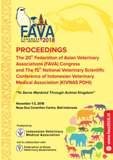SA-11 The Total Count of CPS on Hand Holding Dog Swab in UNAIR Animal Hospital, Before and After Cleaning based on Islamic Rules and Cleaning Using Soap
Abstract
Purify our self from the dirt is highly regarded in Islamic principles because that is one of legitimate requirements of a worship. In Islamic law, dogs are classified including into the severe unclean category, where there are some perspectives against the nature of unclean possess by dog. The way of purification is to wash as much seven times, and one of them using soil (Handi, 2008).
Essentially, the unclean determination for dog saliva is viewed from ritual dimensions, instead of rational, thus there should be no reason logically. Furthermore, we cannot mix the concept of holiness according to the religion with a sterile concept if we relate to the medical side. However, as far as we know the sacred way, surely there is a great secret that Our Creator has saved, thus we need to explore more deeply.
The means of transmitting pathogenic germs has been realized since the 1840s, where proper hand hygiene can reduce or prevent the occurrence of nosocomial infections. Dobson (2003) mentioned that washing hands can prevent more than 1 million deaths per year due to illness diarrhea, while washing hands with soap can reduce diarrhea up to 47%.
Jayne (2002) who compared the number of bacteria that successfully grown from the saliva of dogs, cats and humans, mentioned that bacteria in dog saliva had the largest number with 53 colonies, while cats had 16 and human with 5 colonies. The bacteria derived from dog saliva have the fastest grow and the most varied colonies colors.
Staphylococcus sp. is a normal flora that we can find on the skin, ears, swabs of nasal mucosa and mouth, also saliva of dog. This bacterium includes into opportunistic pathogens bacteria that can cause canine pyoderma, abscesses, otitis externa, infection of wound and urinary tract in dogs. In humans, they can cause external otitis, cardiomyopathy and endocarditis, food poisoning outbreaks, catheterrelated bacteremia, pneumonia and brain abscesses (Borjesson, 2014). S.intermedius and S.aureus are bacteria belonging to the Coagulase Positive Staphylococci (CPS) group which plays an important role in cases of skin infections in dogs and they are zoonotic (Hajek, 1967). Tanner et al (2000), reported that this bacterial transmission through pets to humans is a common case at home and inflict various diseases on dog owners.
In Indonesia, limited studies of various causative agents of diseases makes we lack to know whether the cause of the various diseases that are currently emerging. Thus, the efforts of preventive that should be more necessary to do rarely get a serious attention. Whereas very possible, that our lovely pet is one of the source of the various diseases transmissions because of less precise of biosafety.
There is no further proof yet, whether the concept of Islamic purification for saliva of dog also includes the concept of sterility against bacteria based on medical guidance. As an early stage, this paper will be elaborated how the total of CPS from hand swab holder dogs at Animal Hospital of Education, Airlangga University, Surabaya, before and after purification with soil according to Islamic principles and cleaning using soap.
